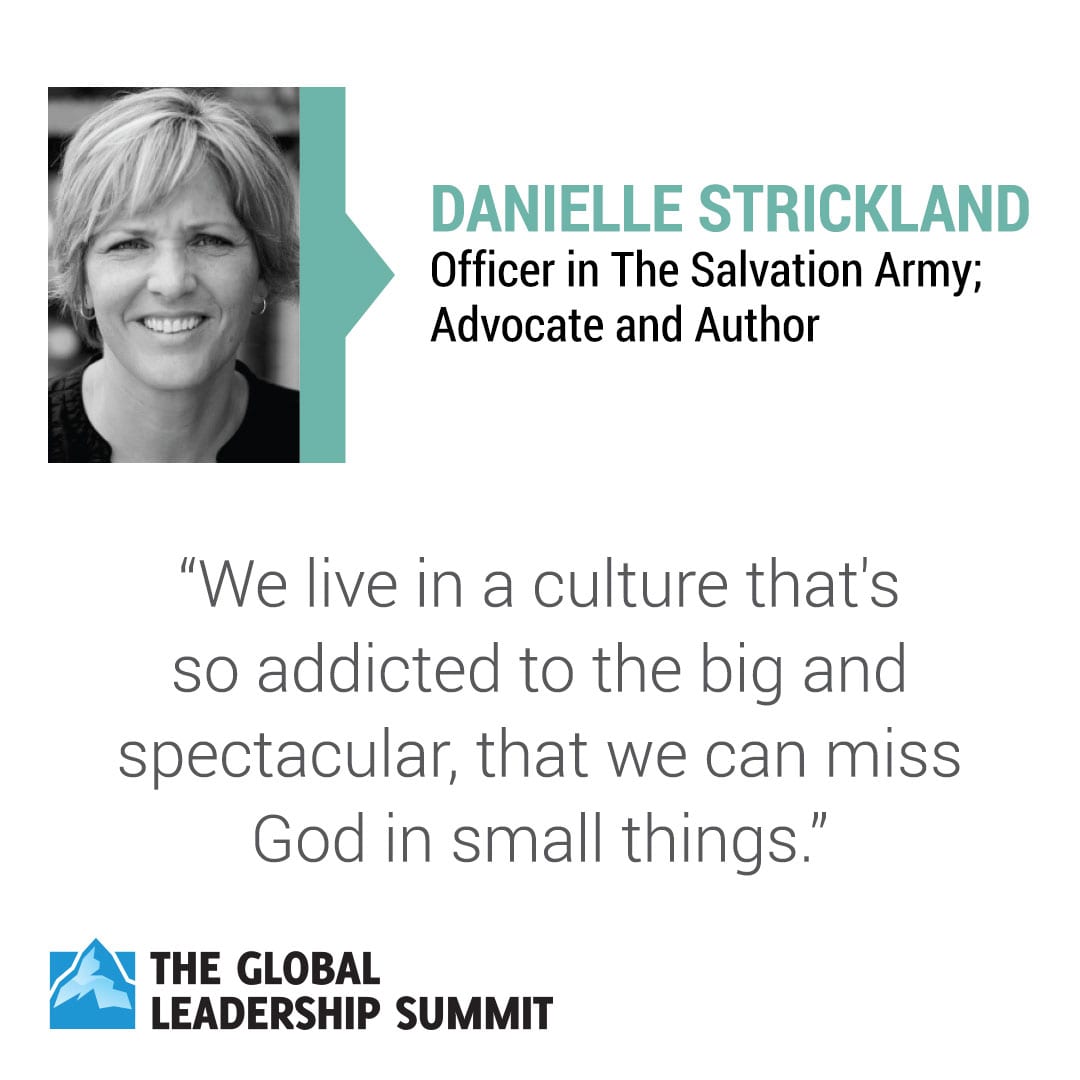
We live in a culture that’s so addicted to the big and spectacular, that we can miss God in small things.

We live in a culture that’s so addicted to the big and spectacular, that we can miss God in small things.

The news coverage of Dylan Roof’s trial is a painful reminder of the recent visit my wife and I made to Mother Emanuel AME Church, in Charleston, South Carolina. In June 2015, our nation was shaken by a shocking act of racially motivated violence when Dylan Roof walked into the weekly Bible study at Mother Emanuel with a gun. Unaware of his intentions, the group warmly welcomed him. However, he could not be deterred from his intention to ignite a race war.
Roof killed nine church members and left one wounded; five others were physically unharmed. His expected outcome never materialized – two days later, during a nationwide broadcast of a judicial hearing, some members of the victim’s families forgave him for his heinous acts.
Mother Emanuel has a long history of facing tragedy and violence with faith and hope. In the early 1800s, some members were tried and executed for worshipping without a sufficient number of white people present. The church’s traditional black worship style has always called for great hope in the midst of profound injustice.
As Sunday approached, we wondered if we would be welcome. Would members of the congregation understand our desire to worship with them and mourn the loss of their pastor and their brothers and sisters? Would they understand that we also were mourning that such an appalling act could take place in our nation? As is often stated, “Sunday morning is the most segregated time in America.”
 Rev. Dr. Betty Deas Clark was named pastor to replace the fallen Senior Pastor and State Senator, Clementa C. Pinckney. She has ably and sensitively led the church through the pain of loss while managing the issues that have emerged since the shootings.
Rev. Dr. Betty Deas Clark was named pastor to replace the fallen Senior Pastor and State Senator, Clementa C. Pinckney. She has ably and sensitively led the church through the pain of loss while managing the issues that have emerged since the shootings.
“Gone But Never Forgotten” is how the church has chosen to respond to this most recent tragedy. Not as a rallying cry for protest, but as an affirmation that forgiveness, reconciliation, and healing must continue. In a plea for a better future, Dr. Clark said, “Mother Emanuel has been changed for all eternity and now we must change with that change.”
When I entered the fellowship hall for the Bible Study, it was impossible not to imagine what it must have been like the night of the shooting. Pictures and memorials in the room gave mute testimony to the inconceivable event. After the study, I spoke with a man who had been on his way to the church that tragic night when he received a call to return home. He was plagued with many unanswerable questions.
Dylan Roof never denied his role in the incident and a jury found him guilty on all 33 counts on December 15, 2016. There was no report of celebration at the church. I suspect church members are satisfied that justice is being served and will patiently await sentencing. Perhaps forgiveness has taken away any desire for revenge.
We went to Mother Emanuel wanting to understand how such lavish forgiveness could be extended in the face of hatred. We wanted to stand with the church and worship together with hope and expectation that better days will come. While there, we saw that forgiveness is never cheap; the people of this church continue to pay an enormous price to forgive.
Authentically living out our faith always has a cost.
“Blessed are the peacemakers, for they will be called children of God.” (Matthew 5:9)
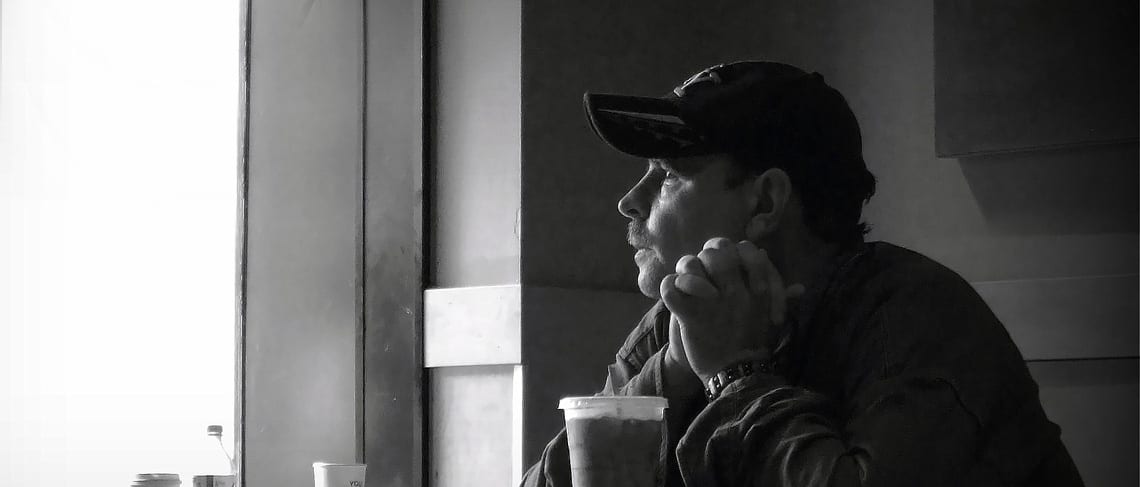
I had just finished preaching my final service at my church.
I was gathered with a few close friends for lunch at a nearby restaurant, and we were enjoying a meal together to mark the end of my season with them. As our server refilled drinks, he stopped in the middle of his task and focused directly on me, asking, “Aren’t you a pastor at that church here in town?”
I paused. Despite having just walked out of the church 30 minutes ago, I had to answer honestly: “I used to be.”
I used to be.
Whether you’re a pastor, engineer, manager, business owner or a leader in another field, each of us will wrestle with an “I used to be” at some point in our career.
In my field, I’ve watched pastors faithfully serve a community for 20, 30 or even 40 years, and then transition out. Oftentimes these individuals — usually steady and consistent people — walk through a tumultuous season of identity questions. Who am I when a staff team no longer reports to me? What do I do with myself, my experiences, my aspirations when no one “needs” me anymore?
Though my journey as a pastor in our community lasted less than 10 years, I have been through my fair share of searching and it’s left me with a growing compassion for anyone who “used to be” someone else.
When I heard T.D. Jakes’ session at the 2016 Global Leadership Summit, something clicked. He said, “We get trapped by titles. We buy into how they describe us, and stop seeking.”
While I had always pictured a calling as a fixed, stationary thing, his words about “seeking” sparked a different kind of clarity in me. If we allow our sense of calling to truly guide our choice of profession or field, then perhaps we haven’t “found” our calling as much as we are exploring it.
For example, in my new role with the Church Relations Field Team at the Willow Creek Association, I’m no longer directly “pastoring” a congregation of people. Instead, I travel around the country, meeting and working with pastors and church staff teams (as well as a variety of marketplace leaders) to bring the Global Leadership Summit to their respective communities. While I no longer play the same role, I am continuing to explore the same calling to lead in the local church, albeit from a different angle and position on the field.
Exploration is constant uncovering, learning and adapting. If we are indeed following the “true north” of our calling, or as Bishop Jakes put it, “finding the common denominator,” then each transition from one position with an organization to another is simply a new chapter in the exploration of our calling.
In that case, while we may miss the culture, friends and environment of the last role we had (a true grieving point), we need not fear the loss of our identity. What we used to do may be gone, but who we are remains a ripe field for exploration.
If you’re up for a little exploring, I offer a few steps that I’ve either consciously or unwittingly taken in recent months. Maybe you can give them a try or invent some of your own:
Drill Down to the Core: If the organization you are currently in folded tomorrow, what would you be looking for next? What’s the essence of what motivates and energizes you, regardless of title, position or even organization? Like Bishop Jakes referred to in his message, what’s the “common denominator” to who you are, not just what you currently do?
Sidestep the Title Trap: What practices are currently “unbecoming” of your title? Associating with certain employees? Spending time doing “menial” activities? Divesting yourself of the window or corner office? There are perks of your role that become “trappings” – meaning, they trap you into a certain way of thinking about yourself. The substance of your calling isn’t found in the furnishings of your title – get outside of them, experiment with them. You may not “discover your calling” immediately, but you will discard flimsy limitations by acting independently of what status dictates you “ought” to do.
Have Fun Failing: Is there an activity or subject you can pour yourself into and fail at miserably – but rather than experiencing frustration, you find yourself inspired to dig in deeper, to learn how to course correct, and continue trying with genuine joy? Perhaps it’s something completely unrelated to your current role or job, but whatever it is, it’s tapping into a source of authentic humility and tenacious joy. If the challenge doesn’t deflate you, but calls you forward – whether it’s cooking, writing, athletics, music, karate or karaoke – don’t dismiss it as trivial. It may not be your actual calling, but it’s touching a deep part of you that is connected to it.
Beware Wanderlust: There’s a difference between exploring your calling and escaping it. Sometimes the road is rough and the hill is steep, but that doesn’t mean it’s time to find a way out by “finding yourself.” Do the work with God and with honest people in your life to make sure you’re not just bored, tired, hurt or dissatisfied for reasons that can be resolved through wise self-leadership.
Steward the Now: The unknown future and untapped potential ahead of you doesn’t give you license to shirk your current leadership responsibilities. Often it’s our faithfulness with our current station that affords us the opportunity to diversify into new areas or pursue a passion. Don’t be lulled into thinking “this is all there is,” but honor your people enough to “give it all you have.”
Discovering “how much is in you” is a unique challenge entrusted to you by God – no one else will do it for you.
Others may see glimpses and point you in the right direction, circumstances may offer you new opportunities, the titles you wear will come and go, but the true expedition of your calling – that is up to you.
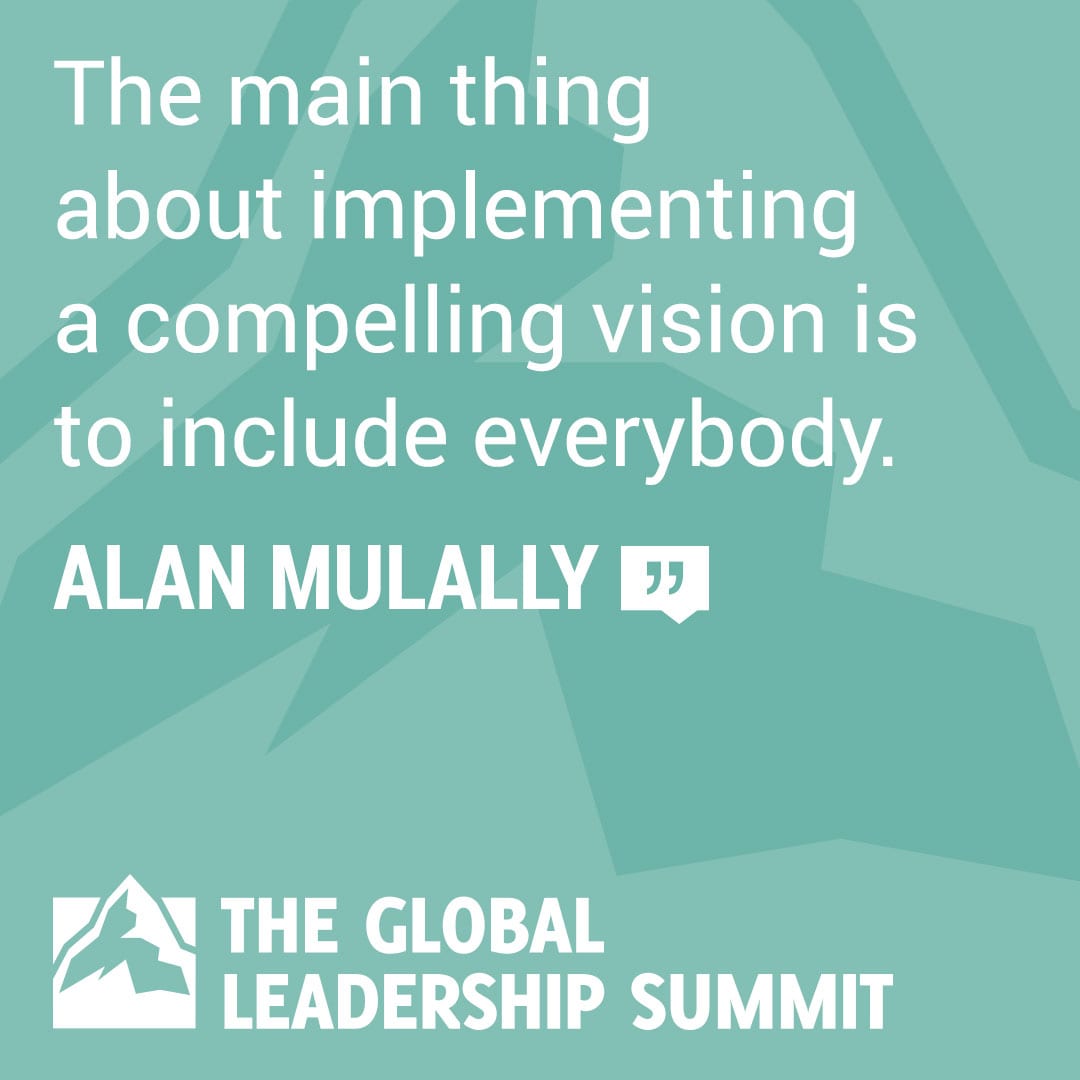
The main thing about implementing a compelling vision is to include everybody.
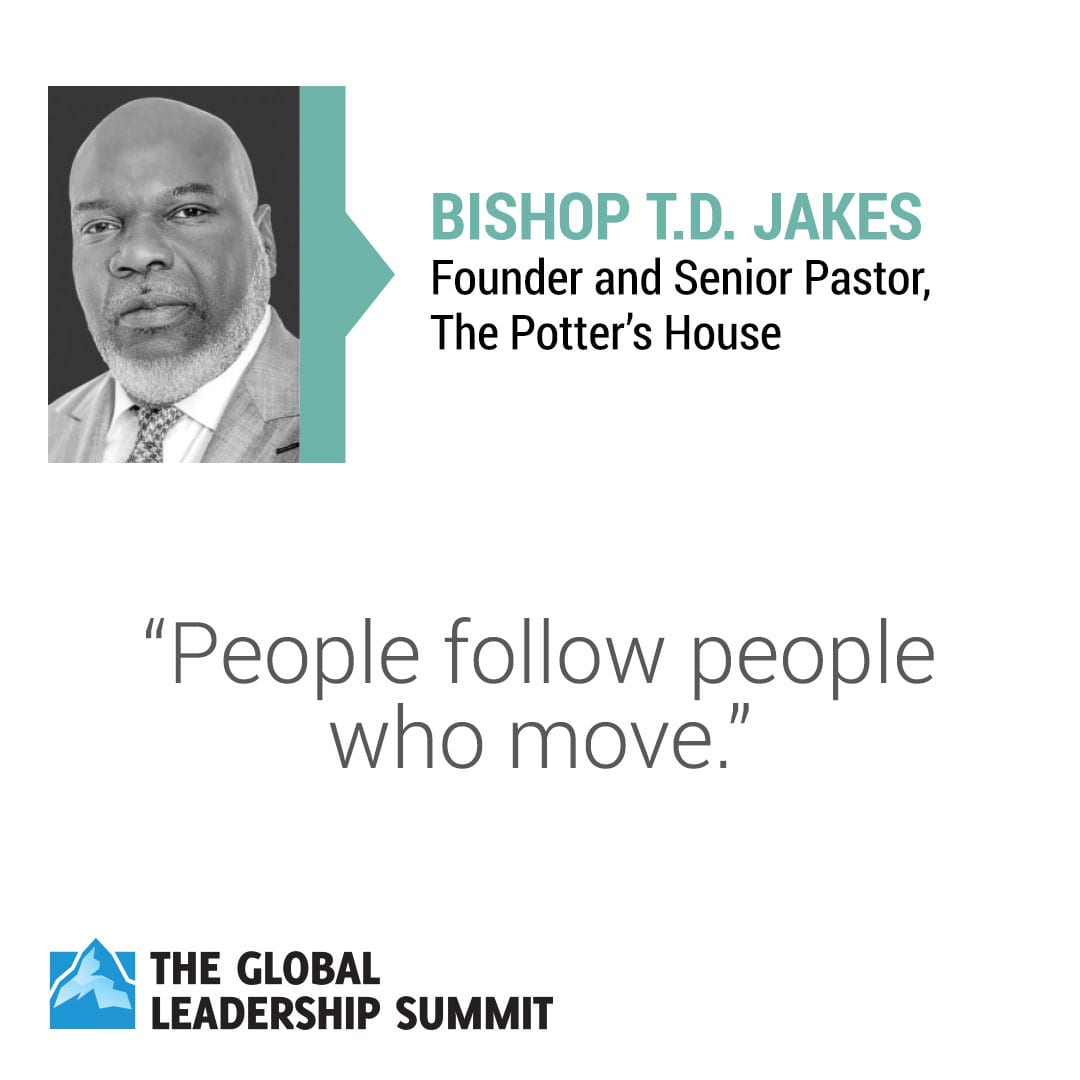
People follow people who move.

If you will do what you can do, God will do what only He can do.
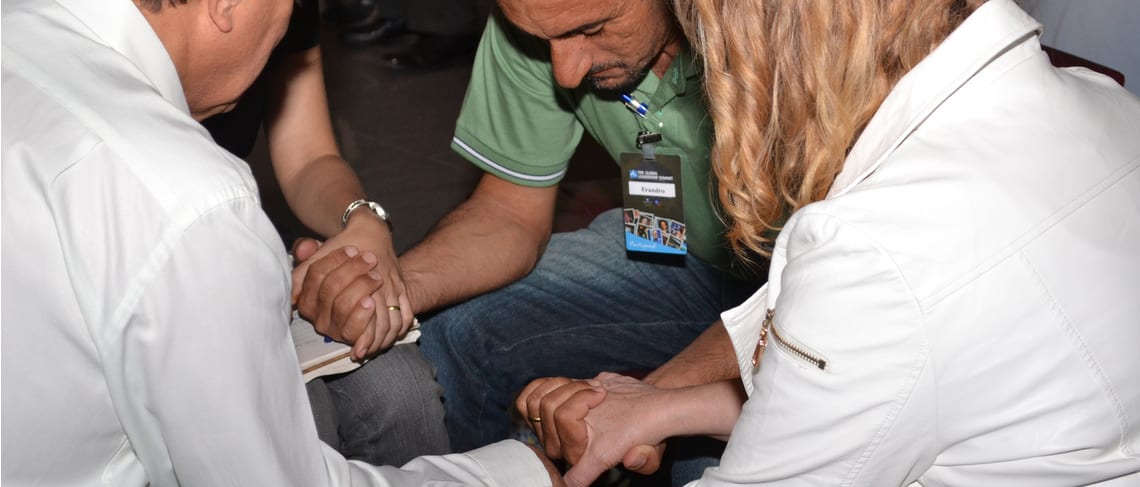
In Sao Mateus, a remote, isolated city in Brazil, three hours away from the nearest airport, the Global Leadership Summit is continuing to inspire a small church with a Grander Vision for their community.
After last year’s GLS, and hearing Warden Burl Cain’s story about how he transformed one of the worst prisons in the U.S., this church was inspired to go into prison ministry.
Since then, 21 prisoners have accepted Christ as the savior and were baptized! At this year’s GLS, one of these men shared his testimony and surprised the attendees with a prison choir who closed the GLS event.
Grander Vision stories continue to inspire leaders in Sao Mateus, Brazil and the church is beginning to engage and build into their community in new ways they have never tried before.
This Christmas, they decided to cancel their regular Sunday Christmas service and create a campaign called “Sunday church without walls.” Groups are forming, and making plans to go into three slum communities to hand out toys to kids. Even non-Christians from the community are joining the endeavor.
Because of the GLS, the church is discovering new ways to reach and serve their community, and church engagement is at it’s highest.
Thank you for supporting the GLS in Brazil. Because of your support and prayers, people are discovering Jesus, and finding hope.
Learn more about how to support the GLS this season at www.willowcreek.com/give

Great leaders ask the questions and let others find answers.

The more expansive the calling, the more likely we are to experience feelings of self-doubt. Tony Dungy (GLS 2010) recently wrote a deeply personal post about how he overcame self-doubt at critical junctures in his leadership journey.
Self-doubt is normal, especially when you experience new situations. The most confident people still have their moments, while with others, self-doubt can be so overwhelming it can paralyze the person. I was fortunate to have parents who instilled confidence in us that we could accomplish anything with God’s help. Even with that kind of foundation of love and encouragement, it can still be difficult when facing unknown challenges. This has been the case with my life.
When I Went to College
As a freshman in college, I thought I was a good athlete and student, but I questioned myself. I wondered how it was actually going to be. Will I be able to live up to the success of those who came before me or will I fall short?
When I Went into The NFL
After college, I went undrafted to the talented Pittsburgh Steelers in the NFL. Self-doubt crept into my head again. The same thoughts I had in college came flooding back. Can I even make this team? Would I be good enough?
When I Became a Coach
Fifteen years later, I received an opportunity as the new head coach of the Tampa Bay Buccaneers. I had the thoughts: Is this going to work? Am I going to be able to do it? Do I have the right formula? Those thoughts only intensified after we lost our first five games.
Those two things have helped me overcome self-doubt.
Have you ever had self-doubt? How have you overcome it?

Despite West Point Military Academy’s rigorous selection process, one in five students drop out by graduation day. A sizeable number leave the summer before freshman year, when cadets go through a rigorous program called “Beast.” Beast consists of extreme physical, mental, and social challenges that are designed to test candidates’ perseverance.
University of Pennsylvania psychologist Angela Duckworth conducted a study in which she sought to determine which cadets would make it through the Beast program. The rigorous interviews and testing that cadets went through to get into West Point in the first place told Angela that IQ and talent weren’t the deciding factors.
So, Angela developed her own test to determine which cadets had the mental strength to conquer the Beast. She called it the “Grit Scale,” and it was a highly accurate predictor of cadet success. The Grit Scale measures mental strength, which is that unique combination of passion, tenacity and stamina that enables you to stick with your goals until they become a reality.
To increase your mental strength, you simply need to change your outlook. When hard times hit, people with mental strength suffer just as much as everyone else. The difference is they understand life’s challenging moments offer valuable lessons. In the end, it’s these tough lessons that build the strength you need to succeed.
Developing mental strength is all about habitually doing the things that no one else is willing to do. If you aren’t doing the following things on a regular basis, you should be, for these are the habits that mentally strong people rely on.
Mental strength is as rare as it is important. The good news is that any of us can get stronger with a little extra focus and effort.
“We welcome and encourage comments on this site. There may be some instances where comments will need to be edited or removed, such as:
If you have any questions on the commenting policy, please let us know at heretoserve@globalleadership.org”
Recent Comments